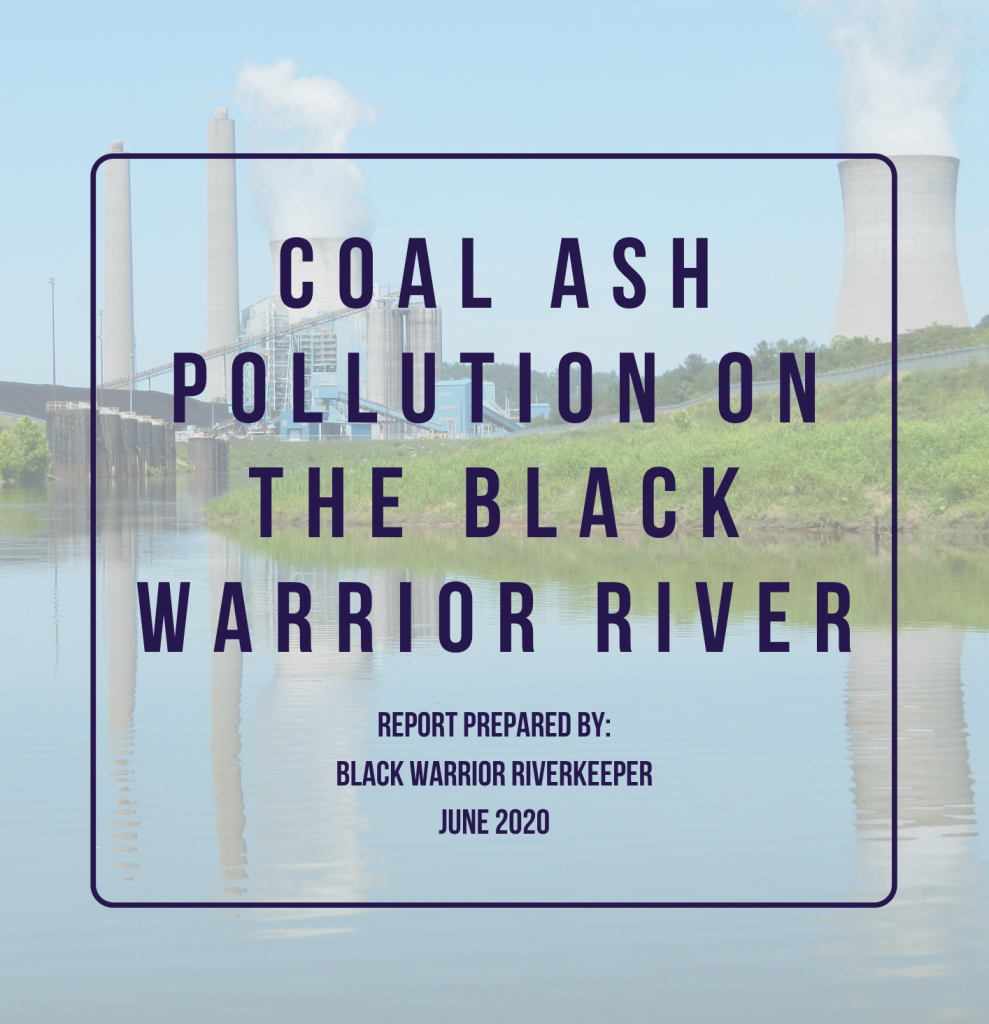Coal Ash Meetings During COVID
Alabama Power to Hold Public Meetings on Coal Ash Despite Lack of Public Notice
Black Warrior Riverkeeper Part of Petition for Postponement, Social Distancing and Virtual Option
For Immediate Release: June 25, 2020
Contact: Nelson Brooke, Black Warrior Riverkeeper: [email protected]
Birmingham, Ala. – Black Warrior Riverkeeper is raising a red flag about public meetings Alabama Power intends to hold on June 29, July 1, and July 7 on the utility’s Assessment of Corrective Measures (their plan to cap-in-place) toxic coal ash ponds at Plant Gorgas, Plant Miller, and Plant Greene County. While the meetings are required by law, the company has kept the notice quiet with virtually no outreach, no detailed plans for social distancing, and no option for virtual attendance. Black Warrior Riverkeeper is alarmed by the company’s attempts to suppress turnout. Along with other concerned stakeholders, Black Warrior Riverkeeper is petitioning Alabama Power to postpone the meeting in light of the COVID-19 pandemic and Alabama’s “Safer at Home” plan to combat the virus.
“Alabama Power plans to cap-in-place 55 million tons of toxic coal ash in unlined, leaking pits on the banks of the Mulberry Fork at Plant Gorgas, Locust Fork at Plant Miller, and lower Black Warrior River at Plant Greene County. Alabama Power is irresponsibly holding public meetings on short notice, as Alabama’s COVID-19 cases are spiking alarmingly, which is on par with the utility’s seemingly low level of regard for public health and safety, given their refusal to responsibly remove their toxic coal ash next to our rivers,” says Nelson Brooke, the Black Warrior Riverkeeper.
In spite of the fact that Alabama Power is a $6 billion revenue company with a huge PR department, a company-run “news” site (Alabama News Center), and contracts for additional PR work with numerous advertising firms, notice about the meeting was only made in limited ads placed in local papers. Even Alabama Power’s own Facebook page with more than 54,000 followers shows zero upcoming events. These meetings are among several scheduled throughout the state. Plant Greene County’s will be on June 29 from 5-7pm at Carver Community Center in Eutaw; Plant Gorgas’s will be on July 1 from 5-7pm at Alabama Power’s HVAC Training Center in Jasper; and Plant Miller’s will be July 7 from 5-7pm at the West Jefferson Town Hall.
The meetings are supposed to provide an opportunity for members of the public to ask questions and learn more about Alabama Power’s plans to dispose of toxic coal ash in their communities. Similar meetings in North Carolina in 2019 had to turn people away because buildings exceeded their maximum occupancy (~450); their participation was identified as one factor in that state’s decision to reject cap-in-place as the preferred method for coal ash disposal.
Utility companies have two options to deal with their coal ash pits: excavating the ash and taking it away for recycling and landfill disposal, or leaving it in place and covering it up. Alabama Power has chosen to cover the ash (the “cap-in-place” method) to close its Black Warrior River coal ash disposal facilities, even though most states in the southeast (Virginia, North Carolina and South Carolina) are excavating their ash. Even Georgia Power has announced plans to excavate some of its more vulnerable ash ponds.
According to Alabama Power’s own sampling, all three ash storage facilities on the Black Warrior River are currently contaminating the groundwater around them with toxic pollutants. Alabama Power has self-reported exceedances of mandated Groundwater Protection Standards for arsenic, lithium, cobalt and molybdenum at its plants along the Black Warrior River. The utility estimates that under their current cap-in-place closure plans it will take at least 30 years for groundwater contaminant levels to return to safe levels.
Black Warrior Riverkeeper has compiled an extensive new report documenting the dangers of coal ash at the three plants located in the Black Warrior River watershed. Black Warrior Riverkeeper and partners throughout Alabama have also recently launched a statewide coal ash website: AlabamaCoalAsh.org
Today, Alabama Rivers Alliance, Black Warrior Riverkeeper, Coosa Riverkeeper, Mobile Baykeeper and Southern Environmental Law Center are urging the company to postpone the meetings and give the public proper notice. The nonprofits are also advocating for a town hall format to give people an opportunity to speak and ask questions, with proper social distancing measures, as well as a virtual attendance option and recording. Anyone can sign the groups’ petition at actionnetwork.org/petitions/let-the-public-be-heard-at-public-meetings-on-toxic-coal-ash-2
“How can you have a public meeting without the public? The law requires these meetings for a reason: improper closure of these ponds pollutes our waterways puts all of us at risk,” says John Kinney, Black Warrior Riverkeeper’s Staff Scientist. “Alabamians deserve clean water and an opportunity to be heard before Alabama Power makes a decision about whether to leave toxic coal ash where it is or safely remove it.”
###
Black Warrior Riverkeeper (blackwarriorriver.org) is a membership-based nonprofit environmental advocacy organization whose mission is to protect and restore the Black Warrior River and its tributaries. We hold polluters accountable and promote clean water for all.













